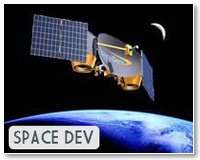 |
Bethesda MD (SPX) May 20, 2011 The trip to Mars just got a little more difficult now that French researchers have discovered that antibodies used to fight off disease might become seriously compromised during long-term space flight. In a new report published online in the FASEB Journal, the scientists show that antibodies produced in space are less effective than those produced on terra firma. The reduced effectiveness of antibodies makes astronauts more susceptible to illness, while increasing the danger posed by bacteria and viruses likely to coexist with wayfaring astronauts. "We hope to find efficient pharmacological and/or nutritional countermeasures to alterations of the immune system that could be useful to astronauts and to people who have weak immune systems on Earth because of infections, aging, or chronic stress exposure," said Jean-Pol Frippiat, a researcher involved in the work from the Faculty of Medicine, Development and Immunogenetics at the Universite Henri Poincare-Nancy, Vandoeuvre-les-Nancy, France. To make their discovery, Frippiat and colleagues conducted studies using three groups of amphibians. Amphibians were chosen for the work because they use the same cellular mechanisms to produce antibodies as humans do. The first group of amphibians was immunized in space, the second was immunized on Earth, and the third was not immunized at all. Comparison of the antibodies produced revealed that the quality of the antibodies generated by the group immunized in space was decreased. This suggests that spaceflight conditions alter the immune system and affect its ability to protect against infections and tumors, posing a serious risk for astronauts. "This paper shows that somatic hypermutation occurs at a lower frequency in spaceflight and brings together yet more evidence that the immune system is dependent on gravity," said Millie Hughes-Fulford, Ph.D., NASA Science Astronaut; Professor, Department of Biochemistry and Biophysics, UCSF; Director, Laboratory of Cell Growth, VAMC/UCSF; and editorial board member of the FASEB Journal. "Dependence on gravity should be no surprise since all of earth's jawed vertebrates developed in earth's gravity, and it would be logical to expect that some systems would require gravity for normal function." "Outer space may be the final frontier, but this research shows that our inner space could pose the greatest threat to the success of a mission," said Gerald Weissmann, M.D., Editor-in-Chief of the FASEB Journal. "These explorers will have to be prepared not only for the challenges of extremely hostile environments, but also those posed by microbial stowaways, even those with which we peacefully co-exist on Earth." Matthieu Bascove, Nathan Gueguinou, Berenice Schaerlinger, Guillemette Gauquelin-Koch, and Jean-Pol Frippiat. Decrease in antibody somatic hypermutation frequency under extreme, extended spaceflight conditions. FASEB J. published ahead of print, May 18, 2011, doi: 1096/fj.11-185215
Share This Article With Planet Earth
Related Links Federation of American Societies for Experimental Biology Space Medicine Technology and Systems
 Drugs in space may need special handling
Drugs in space may need special handlingHouston (UPI) Apr 14, 2011 Drugs intended to treat minor illnesses of astronauts in space may need special handling to remain stable in the environment of space, NASA scientists say. Researchers at the Johnson Space Center in Houston, writing in the AAPS Journal, suggest that some of the pharmaceuticals stored on space flights may have shorter shelf-life than they do on Earth. They compared physical and ch ... read more |
|
| The content herein, unless otherwise known to be public domain, are Copyright 1995-2010 - SpaceDaily. AFP and UPI Wire Stories are copyright Agence France-Presse and United Press International. ESA Portal Reports are copyright European Space Agency. All NASA sourced material is public domain. Additional copyrights may apply in whole or part to other bona fide parties. Advertising does not imply endorsement,agreement or approval of any opinions, statements or information provided by SpaceDaily on any Web page published or hosted by SpaceDaily. Privacy Statement |